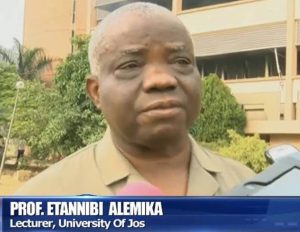Inclusion and its impacts on security and development is the theme of the 2020 Annual Conference of the Social Science Academy of Nigeria, (SSAN). Scheduled for June 2020 in Abuja, the conference would be coinciding with what many regard as the peak of elite fragmentation in Nigeria at the heart of which are narratives of exclusion and domination. The conference has not listed any such topics for attention but that fragmentation and associated agitation for one model of inclusion or the other in the long-running tussle for hegemony among the power elite will be the dominant domestic context of it. That situation may only not apply if magic happens and the elite think twice about where they seem to be taking Nigeria to with escalating lack of consensus.

A screenshot of Prof Etannibi Alemika, the sole person whose name appeared simply as Conference Editor
At the academic level, the tussle is likely to be between contending narratives of security given what has come out from the academia in the analysis of Boko Haram, nearly all of which are highly influenced by positivist reasoning. It is not clear if the post-positivist perspective of security in Nigeria today will advance to be recognised at this conference. Other areas of tension would most likely be the much trumpeted link argued to exist between security and development and what the organisers are framing as measurement of variables such as poverty, inclusion, exclusion, amongst others.
The Academy has already invited abstracts from potential paper presenters, setting a January 2020 deadline for that in a poster being spread around the campuses. It is the first of the processes climaxing in the June date.
The poster is already the talk of the campuses in one particular sense: the complete absence of any sign of desperate, mercantile attitudes that define calls for abstracts nowadays. There are no charges for things taken for granted otherwise. There are just two sentences about the conference but in the two sentences, the important questions of why that theme was chosen and what the conference will look like in terms of structure are taken care of. And the poster itself is not bearing more names than that of the conference editor. Again, that contrasts sharply with the recent feature of multiple names and officials in most posters. All these reinforce the strong fear that no one can predict what would happen to academia after the generation of academics currently serving as the most senior professors or ‘elders’ leave the service.




























